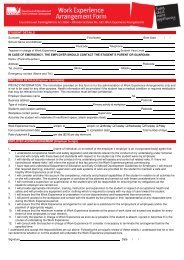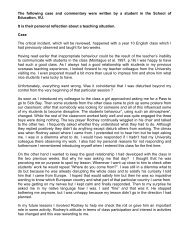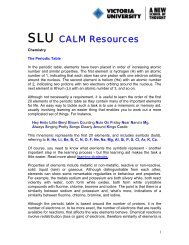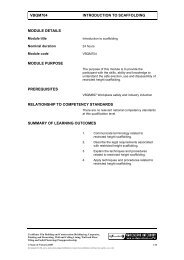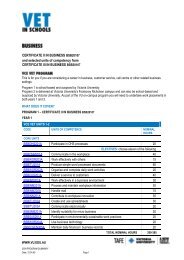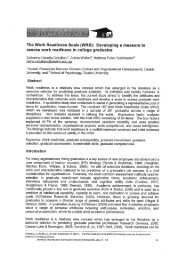Issue 6 2010 - TLS - Victoria University
Issue 6 2010 - TLS - Victoria University
Issue 6 2010 - TLS - Victoria University
You also want an ePaper? Increase the reach of your titles
YUMPU automatically turns print PDFs into web optimized ePapers that Google loves.
His fears concerning his revolutionary theory are laid<br />
bare through the letters. In 1843: “I believe (though<br />
why should I trouble you with my belief, which must<br />
& ought to appear the merest trash and hypothesis)<br />
. . . P.S: Will you . . . keep this one letter of mine to<br />
be returned; as at some future year, I shall be curious<br />
to see what I think now.”<br />
Can you imagine such an exchange via email Most<br />
emails are deleted. And knowing they will be, why<br />
bother to make them good Never mind linguistic<br />
muscle or anything edging on profundity, most lack<br />
basic punctuation. And yet they are ubiquitous.<br />
The Radicati Group, a tech market research firm,<br />
estimates 247 billion emails were sent in 2009<br />
something over 3 million a second.<br />
Richard Sellick, professorial fellow at Melbourne<br />
<strong>University</strong>’s Centre for the Study of Higher<br />
Education, laments the surfeit of computer<br />
information. Everything a business does is on<br />
computer. Researching it is like watching that<br />
company’s history in real time. And the cost of<br />
archiving information means emails usually remain<br />
on computers. And even if a computer is kept for<br />
20 years, who after that time has the technology and<br />
know-how to access it<br />
Then there is the stuff of which letters are made.<br />
Handwriting can be as intimate and reminiscent<br />
as a person’s voice or scent. A letter arrives and you<br />
recognise the hand from the address. It is from a<br />
close friend you haven’t seen for years and you smile<br />
as a throb of memory passes through you.<br />
In 1846 Charles Dickens wrote to a friend,<br />
W.C.Macready:<br />
My Dear Macready,<br />
The welcome sight of your handwriting moves me<br />
(though I have nothing to say) to show you mine,<br />
and if I could recollect the passage in Virginius<br />
I would paraphrase it, and say, ‘Does it seem to<br />
tremble, boy Is it a loving autograph Does it beam<br />
with friendship and affection’<br />
A friend’s handwriting can beam with friendship,<br />
love and affection; it is their voice, and thus their<br />
spirit, laid magically before you. Historian John<br />
Barnes, now working on a biography of La Trobe,<br />
says the man’s handwriting became terrible when<br />
he was under pressure, a nightmare to decipher.<br />
Tweets, texts, emails and Facebook messages are at<br />
least easy to read. But then blots and crossings-out<br />
can say a lot about the state of mind of a person<br />
writing a letter, too. As an execution or an expedition<br />
approaches, the script becomes fevered with telling<br />
amendments.<br />
Strangely, the things that have killed the letter<br />
are not like the letter. They do not replace it or<br />
replicate it. Facebook differs from a posse of idle<br />
teens sitting in a mall only in that Facebook teens<br />
are wearing pyjamas and slathered with pimple<br />
lotions to resemble the Sioux made ready for war.<br />
It is more a spoken communication than a written<br />
one. A conversation. And like most conversations<br />
it is reflexive, speculative, inexact, rambling and<br />
repetitive. Thoughts and inanities are yammered<br />
as they occur. No editing, no shaping, no<br />
contemplation. The moment a comment is received<br />
an answer is expected.<br />
The historian who has taken to trawling through<br />
Facebook for anything of value has accepted the<br />
stone from Sisyphus. Unless some search engine is<br />
invented with a relevance filter fine enough to find<br />
a fact in this bletherworld, she will search forever<br />
because the content is limitless. Every second<br />
thought or musing is now sent to some acquaintance,<br />
or a group, many of whom will respond. Nearly all is<br />
dross. And Twitter Tweets can offer real-time newsbites<br />
of earth-shattering events that help determine<br />
how we see those events. But they are more often<br />
a form of mental dandruff that falls from the gods,<br />
offhand observations from the famous whose every<br />
act or musing is a fascination and a wonder to the<br />
followers who hang on their tweets half-believing<br />
they are eavesdropping on a conversation between<br />
semi-divines who might, at any moment, reveal some<br />
molten gossip about an all-star DNA swap-meet in a<br />
toilet cubicle at 30,000 feet.<br />
Not quite. Ever. Beyonce has just bought some<br />
cool black knee-high boots at Dolce and Gabbana.<br />
Andy Roddick hates trains. President Obama thinks<br />
English kids are cute. Wil Anderson is bored by<br />
awards nights. These are tweets.<br />
One might have optimistically expected<br />
communications to gain in potency as they<br />
diminished in size; that they would distil into poems,<br />
sonnets, haiku and aphorism. They didn’t. Most<br />
tweets resemble fortune cookies written by cats. And<br />
they are without number. (Without comprehensible<br />
number, anyway. Twitterers are tweeting 50 million<br />
messages a day; 6000 tweets a second.)<br />
Texts are something composed on a tram while an<br />
iPod is injecting Arctic Monkeys in your ears. I have<br />
taken the trouble to translate a famous letter into a<br />
text to demonstrate the relative paucity of this new<br />
communication from the historian’s point of view.<br />
The letter was written by the Koshoviy Otaman Ivan<br />
Sirko and signed by the Zaporozhian Cossacks of the<br />
Ukraine to the Turkish Sultan Muhammad IV who<br />
was demanding subjugation.<br />
Thou Turkish Devil!<br />
Brother and companion to the accursed Devil, and<br />
secretary to Lucifer himself, Greetings.<br />
What the hell kind of noble knight art thou Satan<br />
voids and thy army devours. Never wilt thou be fit to<br />
Page 58







